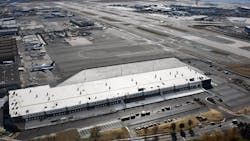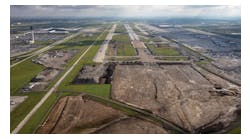JFK's New Air Cargo Facility Sets the Benchmark for Modernization and Sustainability
In December 2024, a partnership between Realterm, the Port Authority of New York and New Jersey (PANYNJ), and Worldwide Flight Services (WFS) completed the most significant air cargo development at John F. Kennedy International Airport (JFK) in more than two decades. The $145 million project delivered a 346,000-square-foot cargo facility on a 26-acre site, replacing outdated infrastructure with an advanced, sustainable logistics hub designed to accommodate the evolving demands of global air cargo.
The new facility, the first built at JFK in over 20 years, represents a pivotal component of New York’s broader JFK Vision Plan. With JFK ranked as the eighth-largest U.S. airport by air cargo tonnage in 2023, handling 1.5 million metric tons that year, the new cargo center is expected to play a vital role in improving processing efficiency, accommodating larger aircraft, and setting a new standard for cargo handling technology and sustainability at a major international gateway.
The need for redevelopment stemmed from long-standing limitations in JFK’s cargo infrastructure. A comprehensive study conducted over a decade ago by the New York City Economic Development Corporation and the Port Authority identified that the airport’s cargo facilities, even the newest ones, were 25 to 30 years old. "They had become functionally obsolete," said a spokesperson for Realterm. "This facility was purpose-built to meet the operational demands of today and tomorrow."
The strategic plan that followed called for sweeping investments in cargo facilities and infrastructure, aimed at maximizing real estate efficiency, enhancing connectivity, and modernizing capacity. Realterm responded to this vision with a design that could accommodate three Group VI aircraft, provide more than 50 dock doors, and integrate temperature-controlled coolers for pharmaceutical handling—a growing demand in global supply chains.
"This project isn't just about square footage. It's about creating a sustainable, technologically advanced platform that can support JFK’s role in international commerce for decades to come," said a Realterm spokesperson.
The development was not without challenges. One of the most complex issues was a 90-inch sewer interceptor line bisecting the project site. Realterm resolved the issue by constructing two separate buildings on either side of the line, then later installing a parallel sewer pipe and unifying the two structures. "It required extensive coordination, ground-penetrating radar, and agile project management to avoid service disruptions and still meet construction milestones," said a Realterm spokesperson.
The cargo facility was constructed as a landside operation, minimizing disruption to JFK’s existing cargo flows. "Site selection was critical," said a Realterm spokesperson. "Because we were able to isolate the construction zone from active airside areas, operations continued with minimal interference."
From the outset, sustainability was central to the design. The building includes a solar panel-capable roof, battery-powered ground service equipment and forklifts, and energy-efficient HVAC and lighting systems. These features helped the project secure LEED Gold certification. "Every design decision prioritized emissions reduction and energy efficiency," said a Realterm spokesperson.
Automation also plays a central role in the facility’s operational strategy. Lödige Industries, a global leader in cargo terminal systems, installed an automated material handling system that includes two elevating transfer vehicles, three-level ULD racks, a castor deck area, three truck docks, and 14 elevating workstations. The warehouse management system integrates with WFS’s proprietary ePic platform and Kale’s Cargo Community System (CCS), enabling digital coordination across trucking, freight forwarding, and ground handling.
"The level of automation here ensures high throughput and minimizes risk," said a Realterm spokesperson. "We’re talking about a facility that can process cargo more safely, more efficiently, and with greater visibility across the supply chain."
The JFK Modern Air Cargo Facility sets a precedent not just in technical achievement but also in community and economic impact. The construction phase generated 350 union jobs and included substantial commitments to supplier diversity. Realterm achieved 28% participation from minority-owned business enterprises (MBEs) and 11% from women-owned business enterprises (WBEs).
"Our outreach with the Port Authority and local communities allowed us to identify capable MWBE partners across all aspects of the project—from construction to professional services," said a Realterm spokesperson. "It was a key goal to ensure the project had a lasting positive impact in Queens and surrounding areas."
The project was funded privately through Realterm, in collaboration with the Port Authority of New York and New Jersey and supported by JFK Vision Plan priorities. While no direct federal funding was reported, the alignment with regional infrastructure strategy ensures long-term public value.
As air cargo continues to evolve, particularly with the rise of e-commerce and temperature-sensitive goods, the JFK Modern Air Cargo Facility positions the airport as a future-ready hub. The Port Authority aims to build on this foundation with further redevelopment that consolidates cargo operations and integrates digital logistics technologies.
"This is a scalable model," said a Realterm spokesperson. "If an airport has the land, this single-story, high-throughput facility can be replicated to dramatically improve cargo operations without overcomplicating the layout."
JFK’s new facility is expected to serve as a blueprint for modern cargo development in North America. With Realterm’s experience across more than 35 airports and its focus on sustainability, automation and stakeholder collaboration, the project demonstrates how public-private partnerships can successfully deliver next-generation infrastructure.
"What we learned here will inform every future build," said a Realterm spokesperson. "From underground conditions to digital system integration, we’ve built a playbook that can help transform how air cargo is managed across the country."






